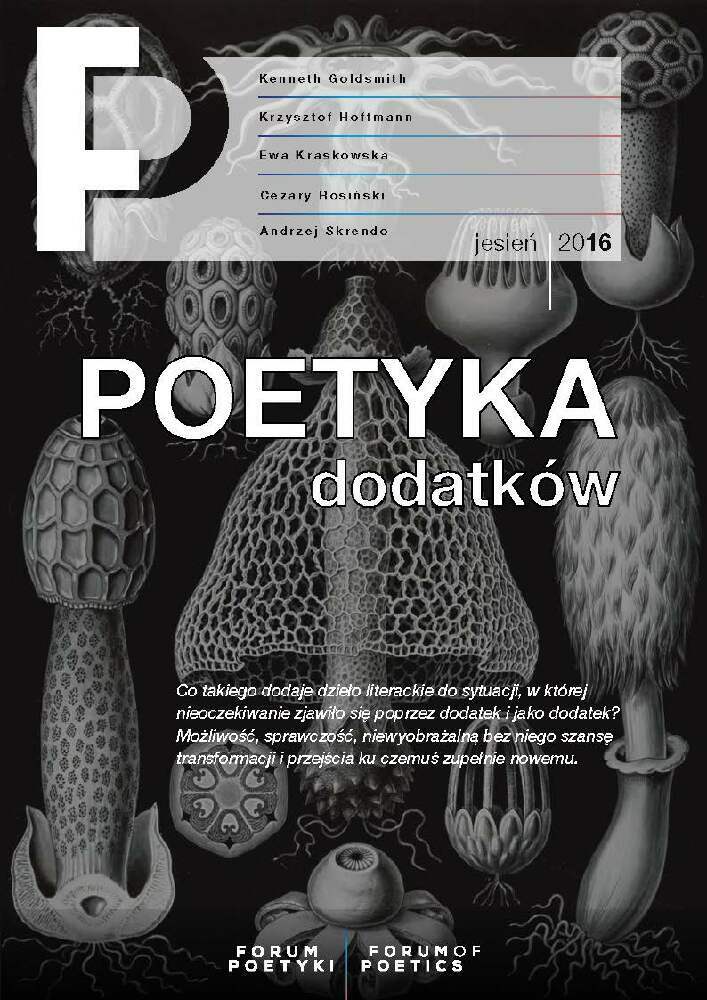Abstract
The article attempts to examine the meeting-point of documentary film and literary culture, understood here in the context of the “event” and its two concrete manifestations, i.e., the poetry slam and the public meeting with an author. In considering this problem, it is difficult to accept the conclusion that the documentary film camera, in following the competition at a slam or the meeting with the author, must limit its participation exclusively to a simple archival function. An analysis of chosen examples (it should also be immediately clarified that the list of film titles embodying the diagnosis here formulated is not extensive) shows that the “encounter” in question contains much broader potential: a documentary can, if nothing else, effectively capture the unique dramaturgy of the event, its semantics as inscribed not only in the word, but also in the image, and conceals within itself great interpretative possibilities. In other words, if we treat film documentarianism as an “addition” to the literary event, we can do so only with an awareness of these implications, which are not always obvious but are certainly significatively relevant.
References
Anderson, Gary L. , i Kathryn Herr, red. Encyclopedia of Activism and Social Justice. T. 3. 3 t. A Sage Reference Publication. Thousand Oaks, Calif.: Sage Publications, 2007.
Bañales, M. „Slam Poetry”. W Encyclopedia of Activism and Social Justice, zredagowane przez Gary L. Anderson i Kathryn Herr. T. 3. A Sage Reference Publication. Thousand Oaks, Calif.: Sage Publications, 2007.
Burke, Peter. Naoczność: materiały wizualne jako świadectwa historyczne. Przetłumaczone przez Justyn Hunia. Kraków: Wydawnictwo Uniwersytetu Jagiellońskiego, 2012.
Burke, Peter. „Narracje wizualne”. W Naoczność: materiały wizualne jako świadectwa historyczne, przetłumaczone przez Justyn Hunia. Kraków: Wydawnictwo Uniwersytetu Jagiellońskiego, 2012.
Burke, Peter. „Od świadka do historyka”. W Naoczność: materiały wizualne jako świadectwa historyczne, przetłumaczone przez Justyn Hunia. Kraków: Wydawnictwo Uniwersytetu Jagiellońskiego, 2012.
Ebert, Roger. „SlamNation”. Https://Www.Rogerebert.Com/ (blog), 23 październik 1998. https://www.rogerebert.com/reviews/slamnation-1998.
Ellis, Jack C. The Documentary Idea: A Critical History of English-Language Documentary Film and Video. Englewood Cliffs: Prentice Hall, 1989.
Filipowicz, Kornel. Biały ptak i inne opowiadania. Kraków: Wydawnictwo Literackie, 1973.
Filipowicz, Kornel. „Moja kochana, dumna prowincja”. W Biały ptak i inne opowiadania. Kraków: Wydawnictwo Literackie, 1973.
Frąckowiak, Maciej, i Krzysztof Olechnicki, red. Badania wizualne w działaniu: antologia tekstów. Warszawa: Fundacja Nowej Kultury „Bęc Zmiana”, 2011.
Kaczmarek, Jerzy. Zobaczyć społeczeństwo: film i wideo w badaniach socjologicznych. Seria Socjologia 73, 2014.
Karabasz, Kazimierz. Odczytać czas. Łódź: Państwowa Wyższa Szkoła Filmowa, Telewizyjna i Teatralna im. Leona Schillera, 2009.
Mahlknecht, Johannes. „The Hollywood Novelization: Film as Literature or Literature as Film Promotion?” Poetics Today 33, nr 2 (2012): 137–68.
Nichols, Bill. „Typy filmu dokumentalnego”. W Metody dokumentalne w filmie, zredagowane przez Dagmara Rode i Marcin Pieńkowski. Prace Naukowe PWSFtviT., Film. Łódź: Wydawnictwo Biblioteki Państwowej Wyższej Szkoły Filmowej, Telewizyjnej i Teatralnej, 2013.
Pasolini, Pier Paolo. „Kino poezji”. W Po ludobójstwie: eseje o języku, polityce i kinie, przetłumaczone przez Izabela Napiórkowska, Mateusz Salwa, i Anna Mętrak. Warszawa: Fundacja Augusta hr. Cieszkowskiego, 2012.
Pasolini, Pier Paolo. Po ludobójstwie: eseje o języku, polityce i kinie. Zredagowane przez Mateusz Werner i Serafino Murri. Przetłumaczone przez Izabela Napiórkowska, Mateusz Salwa, i Anna Mętrak. Warszawa: Fundacja Augusta hr. Cieszkowskiego, 2012.
Pauwels, Luc. „Zwrot wizualny w badaniach i komunikacji wiedzy. Kluczowe problemy rozwijania kompetencji wizualnej w naukach społecznych”. W Badania wizualne w działaniu: antologia tekstów, zredagowane przez Krzysztof Olechnicki, przetłumaczone przez Maciej Frąckowiak. Warszawa: Fundacja Nowej Kultury „Bęc Zmiana”, 2011.
Rode, Dagmara, i Marcin Pieńkowski, red. Metody dokumentalne w filmie. Prace Naukowe PWSFtviT., Film. Łódź: Wydawnictwo Biblioteki Państwowej Wyższej Szkoły Filmowej, Telewizyjnej i Teatralnej, 2013.
Somers-Willett, Susan B. A. The Cultural Politics of Slam Poetry Race, Identity, and the Performance of Popular Verse in America. Ann Arbor, Michigan: University of Michigan Press, 2009
License
Authors of articles are responsible for securing the rights to other publications (texts, tables, drawings and other illustrations) quoted or reproduced in their texts.

